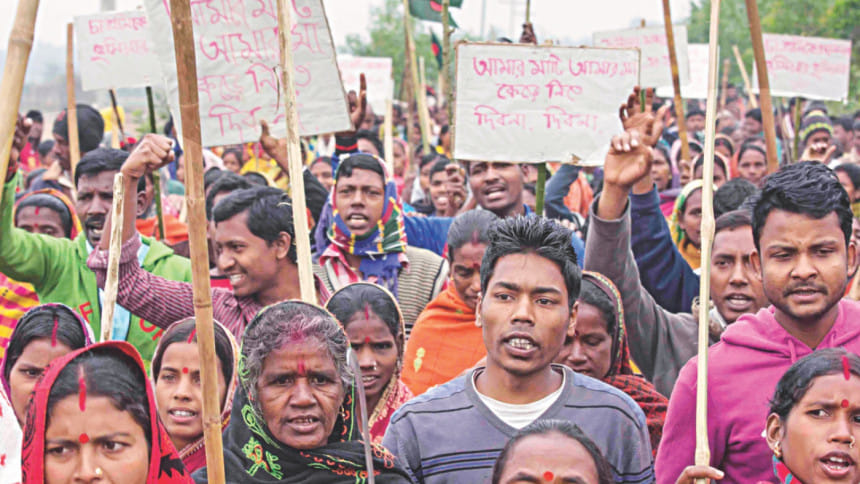They sing songs to save land

Tea garden workers in the district's Chandpur Tea Estate yesterday turned to music to mobilise support for their demonstration against the setting up of a Special Economic Zone (SEZ) there.
Workers from Chandpur, Begumkhan and Jualbhanga tea estates in Chunarughat upazila gathered at Chandpur Tea Estate for a rally in the morning. They also stayed away from work for two hours for the sixth straight day.
Members of Pratik Theatre, a cultural platform of workers, sang patriotic and inspirational numbers, including Je matir buke ghumiye ache lokhho mukti sena, O lo jhingaful ghontata kolijai mare bari, and Ki sunabo cha sramiker gan, at the rally.
Political parties and rights activists warned that the government's decision to build the SEZ on hundreds of acres of arable land would threaten the livelihood of thousands of workers and their families. Chandpur Tea Estate has some 16,000 workers, including 1,664 permanent ones.
Workers also formed a human chain there under the banner of Chandpur Bhumi Rakkhya Committee.
Speaking at the rally, President of Protik Theatre Sunil Biswas said the establishment of the economic zone would lead to eviction of thousands of workers.
The decision of building the SEZ would push many workers towards death, said Nripen Paul, member secretary of Chandpur Bhumi Rakkhya Committee. The workers were not even consulted with on the issue, he added.
Talking to The Daily Star, rights activist Kallol Mustafa said foreign investment was being invited there to “exploit cheap labour”.
He also claimed that the government authorities were not following international labour laws in implementing the proposed project.
On Wednesday, eleven eminent citizens of the country called upon the government to hold open consultations with tea workers before setting up the economic zone on 511 acres of agricultural land at Chandpur Tea Estate.
In a statement, they said they were deeply concerned that a government authority is trying to hurriedly implement the decision to establish the economic zone.
Of the estate's 3,951 acres of land, 951 acres were arable land, which had been cultivated by tea workers of the area for the last 150 years, said the signatories.

 For all latest news, follow The Daily Star's Google News channel.
For all latest news, follow The Daily Star's Google News channel. 







Comments